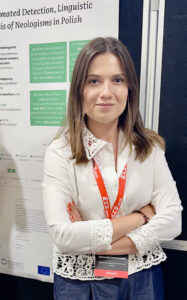YRI: NeoN: A Tool for Automated Detection, Linguistic and LLM-Driven Analysis of Neologisms in Polish
Name: Aleksandra Tomaszewska
Start : 07/07/2025
End: 09/07/2025
Thanks to the YRI Conference Grant, on 7 – 9 July 2025 ENEOLI member Aleksandra Tomaszewska travelled to the 25th International Conference on Computational Science in Singapore to present the paper NeoN: A Tool for Automated Detection, Linguistic and LLM‑Driven Analysis of Neologisms in Polish. The contribution she co‑authored with Dariusz Czerski, Bartosz Żuk and Maciej Ogrodniczuk, was accepted to the conference’s Main Track, giving the team an opportunity to present their work in front of an audience representing the full spectrum of computational science. Details of the event are available at the ICCS website (https://www.iccs‑meeting.org/iccs2025/).

NeoN was designed and created at the Institute of Computer Science of the Polish Academy of Sciences to support researchers in tracking and conducting preliminary analysis of new lexis. Traditional dictionary‑driven methods require extensive manual screening; NeoN instead chains context‑aware lemmatisation, orthographic normalisation, corpus‑based frequency and structural checks, and an LLM‑powered precision filter that proposes definitions, sentiment scores and domain labels. Evaluations reported at ICCS show that this multi‑layered pipeline cuts annotation effort dramatically while preserving high detection accuracy. The full methodological description appears in the Springer proceedings (https://link.springer.com/chapter/10.1007/978‑3‑031‑97635‑3_38), with an extended version on arXiv (https://arxiv.org/pdf/2505.15426).
Aleksandra’s presentation of NeoN at ICCS served two strategic goals. First, it was a chance to demonstrate, for the first time, a reproducible workflow to a community that sets benchmarks for simulation, modelling and large‑scale data analysis. Second, it gave the team direct feedback on the results that will inform their future work.

For ENEOLI, NeoN addresses core tasks of Working Group 2 – Methods, digital resources and tools for neology – by providing a pipeline that researchers can use and/or adapt to their new projects. Its standardised outputs and visual dashboard are also in line with comparative studies conducted by Working Group 3. Importantly, the easy workflow lowers the entry threshold for colleagues less experienced with large‑scale NLP, encouraging broader adoption across disciplines.
A public demo is available at https://neon.ipipan.waw.pl/login (contact the team for credentials). Conference photos – the venue, Aleksandra’s presentation, and the iconic “supertrees” of Gardens by the Bay.

